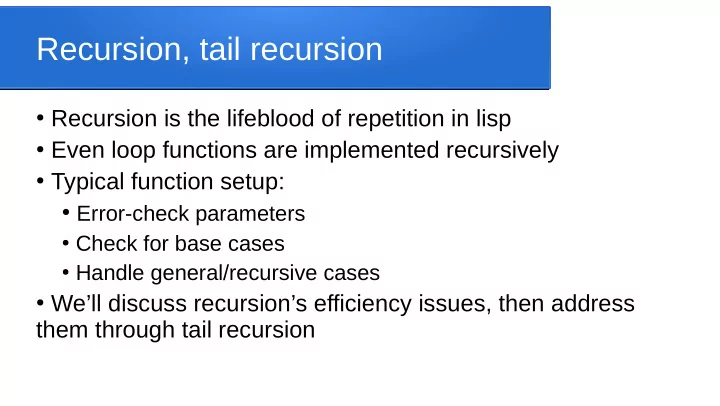

Recursion, tail recursion ● Recursion is the lifeblood of repetition in lisp ● Even loop functions are implemented recursively ● Typical function setup: ● Error-check parameters ● Check for base cases ● Handle general/recursive cases ● We’ll discuss recursion’s efficiency issues, then address them through tail recursion
Example: smallest in a list ● Find smallest integer in list, skip non-integers, return most- positive-fixnum if list contains no integers, nil if not a list (defun smallest (L) (cond ((not (listp L)) nil) ((null L) most-positive-fixnum) ((not (integerp (car L)) (smallest (cdr L)) ((< (car L) (smallest (cdr L))) (car L)) (t (smallest (cdr L)))))
Recursion use of stack space ● Major drawback: every recursive call generates a new stack frame: deep recursion can use all your stack space ● Tail-recursive functions, together with a suitable compiler or interpretter, can avoid this ● A function is tail-recursive iff the result of each recursive call is immediately returned, i.e. not processed before returning
Tail recursive: example ● Tail recursive: each recursive call returns immediately (defun f (x) (cond ((not (numberp x)) nil) ((> 0 x) (f (- x))) ((< 1 x) (f (/ 1 x)) (t (sqrt x))))
Not tail recursive: example ● Not tail recursive: result of at least one recursive call gets processed before the return (defun f (x) (cond ((not (numberp x)) nil) ((> 0 x) (f (- x))) ((< 1 x) (* 10 (f (/ 1 x))) (t (sqrt x))))
How does tail recursion help? ● Function makes its recursive call and immediately returns ● After making the recursive call, the tail recursive function no longer actually uses any of the data in its stack frame ● If compiler recognizes that then it can actually overwrite the stack frame with the stack frame for the recursive call ● Frame profile is exactly the same, same layout for parameters, local vars, etc: just needs to rewrite the actual parameter values for the new call ● The recursive calls thus use no extra stack space
Stack with/without tail rec optimization Param n-1 New local vars Param n Return va l Without optimization Local vars f(n) Calls f(n-1) Return val Param n Local vars Return val Param n Param n-1 With optimization Local vars New local vars Return val Return val
smallest in a list: tail recursive “smallest” example earlier wasn’t tail recursive, see line: ((< (car L) (smallest (cdr L))) (car L)) ● Rewrite smallest in a tail-recursive fashion ● Add a helper function that takes an extra parameter: the smallest value seen so far ● smallest function calls helper function, with most-positive- fixnum as the starting ‘sofar’ value (defun smallest (L) (if (listp L) (smallhelper L most-positive-fixnum)))
(smallhelper L sofar) ● Smallhelper trusts L is a list, sofar is smallest value so far ● If L is empty return sofar, else compare front element to sofar and call recursively with new smallest so far (defun smallhelper (L sofar) (cond ((null L) sofar) ((not (integerp (car L))) (smallhelper (cdr L) sofar)) ((< (car L) sofar) (smallhelper (cdr L) (car L))) (t (smallhelper (cdr L) sofar))))
Accumulators ● The “sofar” parameter we added to simplify our recursive algorithm is called an accumulator ● Accumulators are widely used to create tail recursive algorithms ● In fact, any loop-based function can be turned into a tail recursive one using an appropriate collection of accumulators
Turning loops into tail recursion: C style int f(int x) { int f(int x, int y = 0) { int y = 0; if (y >= x) return y; while (y < x) { else { print(y); print(y); y++; return f(x, y+1); } } return y; } } Function locals replaced with parameters, initialization replaced with default values Updates to variables in loop replaced with updates to values in recursive call
Recommend
More recommend